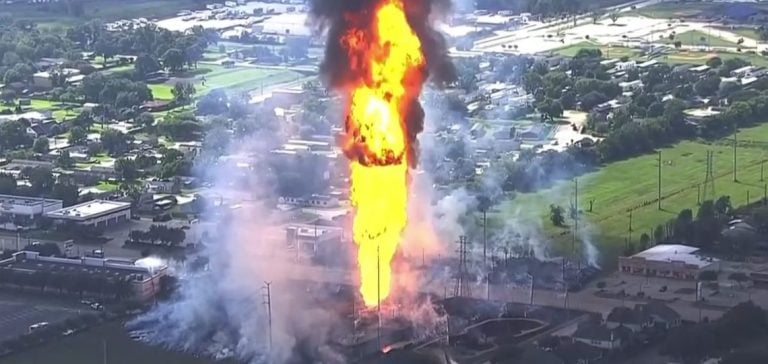A fire on an Energy Transfer natural gas liquids pipeline has been raging for three days in La Porte, Texas.
The fire, which began earlier this week, continues to burn in a controlled manner, allowing the company to manage the situation without danger to the surrounding population.
Authorities were forced to evacuate the area due to the scale of the fire, which also caused power outages for thousands of homes and businesses.
Energy Transfer implemented measures to isolate the pipeline, allowing product residues to burn off safely.
The fire was triggered by a car accident on an above-ground pipeline tap.
Analysts at investment firm Tudor, Pickering, Holt & Co. suggested that the incident might involve the Justice pipeline, a 20-inch conduit that connects Energy Transfer’s Liberty and West Texas Gateway pipelines.
Although the company has yet to confirm the name or capacity of the pipeline involved, the implications of this incident for the natural gas liquids market are already palpable.
Impact on the natural gas liquids market
The Justice pipeline, commissioned in 2012, has a capacity of 375,000 barrels per day and transports a blend of natural gas liquids, known as Y-grade, from the Permian and Eagle Ford shale fields.
This mixture includes components such as ethane, propane, butane, isobutane and natural gasoline, which are essential for various industrial and commercial applications.
The disruption caused by the fire has already had an impact on gas liquids prices, with propane up 7% and butane up 10% since markets closed last Friday.
Analysts believe that Energy Transfer will be able to leverage its extensive network, including its storage assets and the Lone Star NGL line, to mitigate the effects of this service interruption.
The company’s ability to manage this crisis is crucial, not only for its operations, but also for the stability of the natural gas liquids market as a whole.
Safety and regulatory implications
This incident also raises questions about the safety of pipeline infrastructures and safety regulations.
Accidents involving pipelines can have serious environmental and economic consequences.
Regulators may need to reassess current safety standards, particularly for pipelines located in densely populated areas.
Companies in the sector must also prepare for stricter audits and increased surveillance of their operations.
As one pipeline safety expert points out, “incidents like this highlight the need for constant vigilance and updated safety protocols to prevent future accidents.”
Future prospects
As the fire subsides, Energy Transfer is focusing on implementing solutions to extinguish the fire and begin the necessary repairs.
The company has announced that, once the insulation equipment has been installed, it will purge a section of the pipeline with nitrogen to extinguish the fire.
This approach demonstrates a willingness to quickly restore operations while ensuring the safety of workers and surrounding communities.
Recent events underline the importance of proactive risk management in the energy sector.
As the energy transition and decarbonization gain momentum, companies must navigate a complex landscape where safety, regulation and profitability are interconnected.
The lessons learned from this incident could influence future practices and safety policies across the industry.
The repercussions of this fire on the natural gas liquids market and on the perception of pipeline safety could also prompt investors to reconsider their strategies in the sector.
Companies must therefore remain vigilant and adaptable in the face of an ever-changing environment.






















